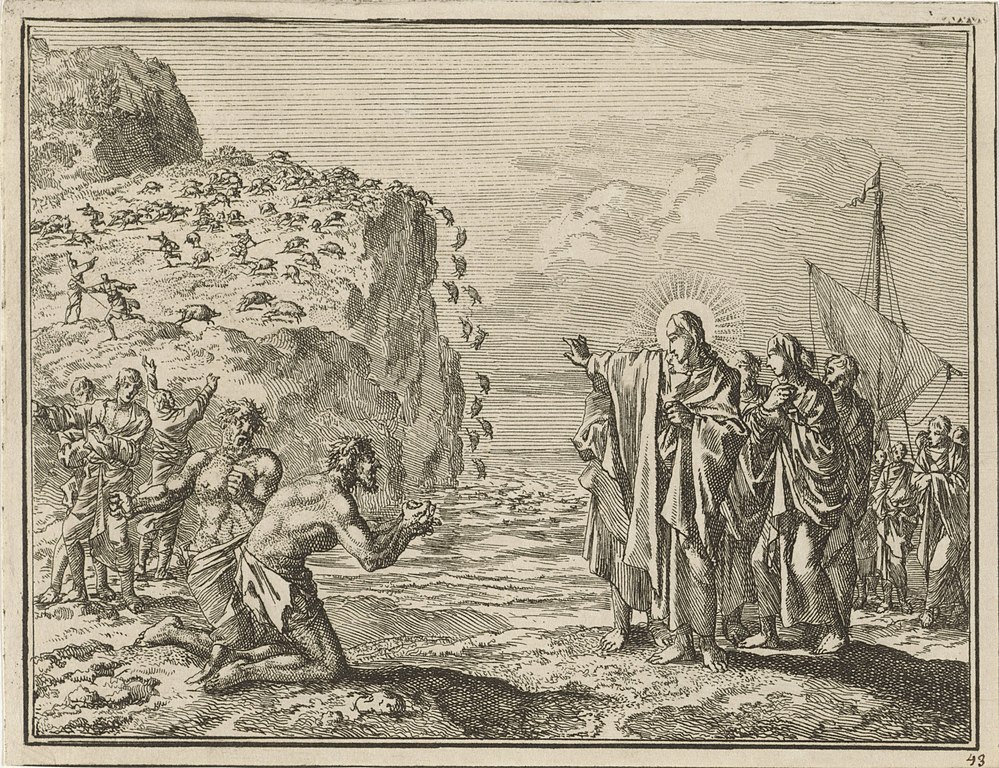I’ve written before (here and here) about the story of the pigs, demons, and Jesus that is told in Matthew 8:28-34 and Luke 8:26-37.
If there is a story that seems to suggest that Jesus thinks little of animals and even Creation itself, this is it. And this is how most interpreters over the centuries, like St. Augustine and Thomas Aquinas, have understood it. They have asserted that this story tells us pigs are disposable beings, whose fate is not worth one iota of concern. We literally have license to kill.
When you come to this story with a mindset already formed by theologies dismissive of Creation, you will very likely come to those same conclusions. This is the story in general of how Christian theologians have assessed Creation’s significance in the whole Bible. Human-centric interpretations have built on earlier human-centric interpretations until readers’ minds and hearts can no longer actually directly experience what they encounter in Scripture nor in Creation.
I will admit that I first examined the story some years back with some trepidation. The story really did seem to suggest that the pigs did not matter to God.
But as I considered the actual data presented in the story, I found another possibility for how to read the story. This possibility – that the pigs actually resisted the demons and sacrificed their lives to eliminate the demons – is quite different from how the story is normally read. But in many ways I believe this reading actually fits the story and the context of Jesus’ life better than more traditional readings.
I am coming back to the story because there is a dimension to it that I didn’t address previously. That dimension is the connection of the story with the book of Job.
A number of other writers and theologians have pointed out the parallels. Specifically, in both Job and the New Testament story, supernatural forces of evil ask for permission from God to afflict a being part of Creation. In the case of Job, Satan asks permission to afflict Job to see if he will be righteous even if everything is taken away from him. In the case of the New Testament story, the demons (“Legion”) beg permission to enter into the nearby herd of pigs.
Is this parallel an accident? Not likely. As the following graphic details, the Bible is brimming with cross-references.

This is a graphic of the 63,779 cross references in the Bible. It was created by Chris Harrison, the Associate Professor of Human-Computer Interaction at Carnegie Mellon University and can be found here. Here’s how Harrison explains the chart: “The bar chart that runs along the bottom represents all of the chapters in the Bible, starting with Genesis 1 on the left. Books alternate in color between light and dark gray, with the first book of the Old and New Testaments in white. The length of each bar denotes the number of verses in that chapter (for instance, the longest bar is the longest chapter in the Bible, Psalm 119). Each of the 63,779 cross references found in the Bible are depicted by a single arc – the color corresponds to the distance between the two chapters, creating a rainbow-like effect.”
Just one example of a meaningful cross reference is when Jesus says, “My God, my God, why have you forsaken me?” while on the cross. This is the first phrase of Psalm 22. This poem initially conveys the experience of being surrounded by those hate you and feeling an overwhelming sense of abandonment. The way this psalm describes the details of that abandonment is eerily parallel to the details of Jesus’ crucifixion. This further roots Jesus and his mission in what was the Scripture of that time. Then, in a dramatic turn, the psalmist voices hope in God’s rescue and asserts that all the families of the nations shall someday worship before God. Jesus’ reference to the psalm creates deeper resonance for the pain he is suffering while also conveying his faith and certainty in an eventual triumph of God’s love. All of this, in a concise way, adds dimensional depth and meaning to that moment.
Similarly, the parallel in the pigs and demon story with the book of Job should prompt us to look for common themes in both stories. In fact, this thematic hyperlink should actually serve as a filter for correct understanding of the story. An interpretation of the pigs and demons story that is in discord with the story of Job must be missing the boat.
There are three elements I see in the book of Job that have significance for the story of the pigs, demons, and Jesus. I detail those below and then weave those elements together with my interpretation of the pigs and demons story.
Insight #1: Creation as Revelation and Delight of God (Job 38-41)
The most dramatic point in the book of Job is when God answers Job’s calls for God to present himself. But instead of arguing with Job about his situation and why Job is suffering, God proceeds to respond with some of the most vivid, expansive Creation poetry ever heard. Here is just a sample from Job 38: 39-41:
Can you hunt the prey for the lion,
Or satisfy the appetite of the young lions,
When they crouch in their dens
Or lie in wait in their thicket?
Who provides for the raven its prey,
When its youngest ones cry to God for help,
And wander about for lack of food?
The book of Job asserts that by paying attention to the vast scale, complexity, beauty, and pure teemingness of life on earth and in the sea one somehow gets a sense of God and God’s transcendence. In short, Creation in its full scope is a revelation of God’s power, majesty, creativity, and mystery. If one reads this and other books of the Bible, it is clear that God is not just aware of this vibrant world but is somehow sustaining of it. A verse I find especially beautiful is Psalm 145:16 – “You open your hand; you satisfy the desire of every living thing.”
The implication is clear. For consistency with the Job-like situation, we cannot read the story of the demons and the pigs as a narrative that dismisses any part of Creation as outside of God’s concern and blessedness. In fact, I would argue this is where the demons make their fatal mistake. They may have assumed the pigs would not have their own volition and readiness to act for God’s purposes.
Insight #2: Creation Teaches Us (Job 12:7-10)
When I interviewed John Kempf and asked him what his favorite Bible verses were, he brought my attention to Job 12:7-10:
But ask the beasts, and they will teach you;
the birds of the heavens, and they will tell you;
or the bushes of the earth, and they will teach you;
and the fish of the sea will declare to you.
Who among all these does not know
that the hand of the Lord has done this?
In his hand is the life of every living thing
and the breath of all mankind.
Interestingly, the first two verses actually foreshadow how God will respond to Job later in the story. This is ironic, because these are Job’s own words to his friends. He is telling his friends to look at Creation to be better grounded in their understanding of God. Job’s words suggest that by having the humility to listen to and to be taught by Creation, we will gain wisdom about God.
How many of us really read these words? Are we really ready to allow our hearts and minds to be impacted? We are used to dictating to Creation what we need and what we will take. Our natural human instinct is to consider ourselves the crown of Creation. What can “dumb” nature teach us, we who are “superior” beings?
And what we learn in Job 12:9-10 is the humbling realization that humanity and the rest of Creation share a common identity. We all exist by the creative power and sustaining grace of God. We do not have ultimate power over ourselves.
The appropriate response to this insight is profound humility before God and a sense of existential kinship with the rest of Creation.
As we consider the story of the pigs and the demons, we must bring humble openness to learning from Creation.
Insight #3: Job’s Righteousness Revealed in Selfless Act (Job 42:7-10)
Reread the last chapter of Job. In our abbreviated memory of the story, we make a beeline from Job’s submission in the face of God’s overwhelming grandeur and hidden purposes to Job’s renewal and restoration.
That misses a crucial section of the story.
In the end, Job is called upon, despite having suffered in so many ways, to pray for Eliphaz and the other two friends who had made Job’s suffering worse. Those friends and the theologies they applied to Job’s situation had not correctly discerned what was happening to Job nor why. Their mistakes and the harm those mistakes caused to Job needed some kind of atonement. Job is called upon to pray to God to forgive those three friends.
And even here we must read carefully. Job agrees to pray for his friends without knowing whether his fortunes will be restored.
Think of that. It is Job who has suffered from what God has allowed Satan to do to him. Not only that, his friends’ arguments compounded the suffering he was already experiencing. He is still, presumably, suffering from the physical afflictions Satan unleashed on him. God has just overwhelmed him and reprimanded him. And Job is asked to act for others with no promise of his own life condition being changed.
And what does Job do? He prays for his friends.
He likely does so out of compassion. He probably does so, too, because he hears from his friends that God had dictated that Job’s prayers were necessary.
And God accepts his prayers. We can assume, I believe, that the prayer is accepted because Job has a new level of humility and faithfulness to God.
The importance of this act of praying is emphasized in Job 42:8-10 by four references to Job’s prayer.
“Now therefore take seven bulls and seven rams and go to my servant Job and offer up a burnt offering for yourselves. And my servant Job shall pray for you, for I will accept his prayer not to deal with you according to your folly. For you have not spoken of me what is right, as my servant Job has. So Eliphiz the Temanite and Bildad the Shuhite and Zophar the Naamathite went and did what the Lord has told them, and the Lord accepted Job’s prayer. And the Lord restored the fortunes of Job, when he had prayed for his friends. And the Lord gave Job twice as much as he had before.”
Again, Job does not know that his fortunes will be restored when he decides to pray and acts on that decision. Only after he prays does God restore Job’s fortunes.
That act of selfless prayer resolves Satan’s challenge that had launched the whole drama. Job, Satan asserts, would not stay righteous even when he has almost everything taken away. In other words, the moment when God’s grandeur overwhelms Job is not the resolution of the story question. Job’s willingness to act for his friends and for God’s purposes is the resolution.
Job’s demonstrates his resilient righteousness by the selfless compassion and obedience that God is calling upon to him to have.
.
Looking Again at the Story of the Demons and Pigs
There are multiple ways in which the thematic hyperlink in the demons and pigs story to the book of Job helps us better understand the underlying meaning of the New Testament story.
Let’s start at the highest and most obvious level – the fact that the demon legion must beg permission of Jesus parallels the situation in Job where Satan needs to ask permission before he can do anything to Job. This establishes Jesus as possessing the power and position of God.
Let’s go to the next level – the drama in each of the two stories.
In Job, the wandering Satan wants permission to torment Job to discredit God by asserting that Job only is righteous because he has been richly blessed by God. This gives Job’s situation cosmic stakes. If Job will stray from righteousness, then Satan will not just have damaged Job but will have proven that God failed when he created humanity. Why? Because God’s hope of having right relationship with humanity out of humanity’s free devotion to God, even when devotion to God is not accompanied by material comfort, had failed.
In the New Testament story, the demons desperately seek to continue to exist in this world by being allowed to move into a herd of pigs. There are cosmic stakes here, too. One is whether Creation, in the form of the pigs, can be twisted and perverted away from its goodness, the goodness that God endowed it with. Another is whether Jesus will allow the demons to continue to be a threat in the region. Will Jesus allow evil to persist?
So, as we read this story and specifically this element of testing, we should read the story like we read the story of Job for the first time. As we wondered if Job’s faith will falter, we must also wonder if the pigs, as surprising representatives of sentient Creation, will falter and allow the demon legion to prevail by permitting them to stay in this plane of existence.
(Here it is important to remember, as I asserted in my earlier piece, that the goal of the demons was to continue in existence in this existence. They would have had no reason to want to cause their hosts – the pigs – to die.)
This is where the three insights from Job come to bear.
Creation in all of its grandeur, epic scale, and mystery is a revelation of God. Pigs, despite being considered unclean animals, are in their own way part of that revelation of a boundlessly creative Creator God. Just one distinctive feature of pigs is their intelligence. Another is their sensitive snout which allows them to root about in the soil, which can be either ecologically valuable or highly damaging, depending on the situation.

Joel Salatin has written this challenging and compelling book in his inimitable style about his Christian faith, his farming, and, yes, his pigs. Here is an essay of his that explores briefly some of the themes he more deeply engages with in the book.
Neither the Romans, for whom pigs were an essential part of their culinary culture, nor the Jews saw pigs in the way God sees them. As Rabbi Chaim Steinmetz writes, “Jews associated the pig with the Roman empire, and the pig was the food of the enemy.”
How deeply unsettling and provocative would it be for both Romans and Jews to consider the possibility of pigs defeating a “Legion?”
How you choose to see pigs in the story reflects how you consider God’s earth. If you see pigs as lowly, dirty, expendable creatures, then you will tend to interpret the story in a way that degrades God’s Creation. But that stance towards Creation is in complete contradiction with the book of Job. If you take the book of Job seriously, then your interpretation of the story of the demons and pigs must begin with acknowledging that pigs are distinctive parts of Creation that have God’s attention and have their own desires.
Just as Job’s selflessness and obedience to God’s purposes with no promise of restoration ultimately proved his righteousness, I would assert that the pigs acted out of selfless service to God’s goodness by refusing to allow the demons twist them and use them for their own purposes. The spirit in which the pigs chose to do what they did is in the same chord as Job’s decision to pray for his friends. And their refusal, an act of spiritual struggle, caused them to lose their lives. You could even say the pigs’ decision prefigures Jesus’ own sacrificial death..
And there is precedence in the Bible for animals acting selflessly and having a better understanding of the spiritual realities around them than humans. We see those traits in Balaam’s donkey.
Paying attention to the thematic cross reference of the pigs and demons story to the book of Job should compel us to do three things. First, see the pigs as creatures, like the wild donkeys and ravens of God’s monologue in Job, that God sustains and cares about and who reflect God in some way. Second, we must shake off the theologies that have built up around this story, like a thick layer of barnacles on a ship’s hull, so that we can see the very real possibility that the pigs were ready to sacrifice their lives to be part of the cosmos-level struggle against evil and chaos. Third, we must pray to God for hearts humble enough to learn from the pigs.
If we do those three things, our minds and hearts will be open to the true spiritual significance of the story. And that will have implications for how we live out the joys and responsibilities of taking care of God’s earth.





